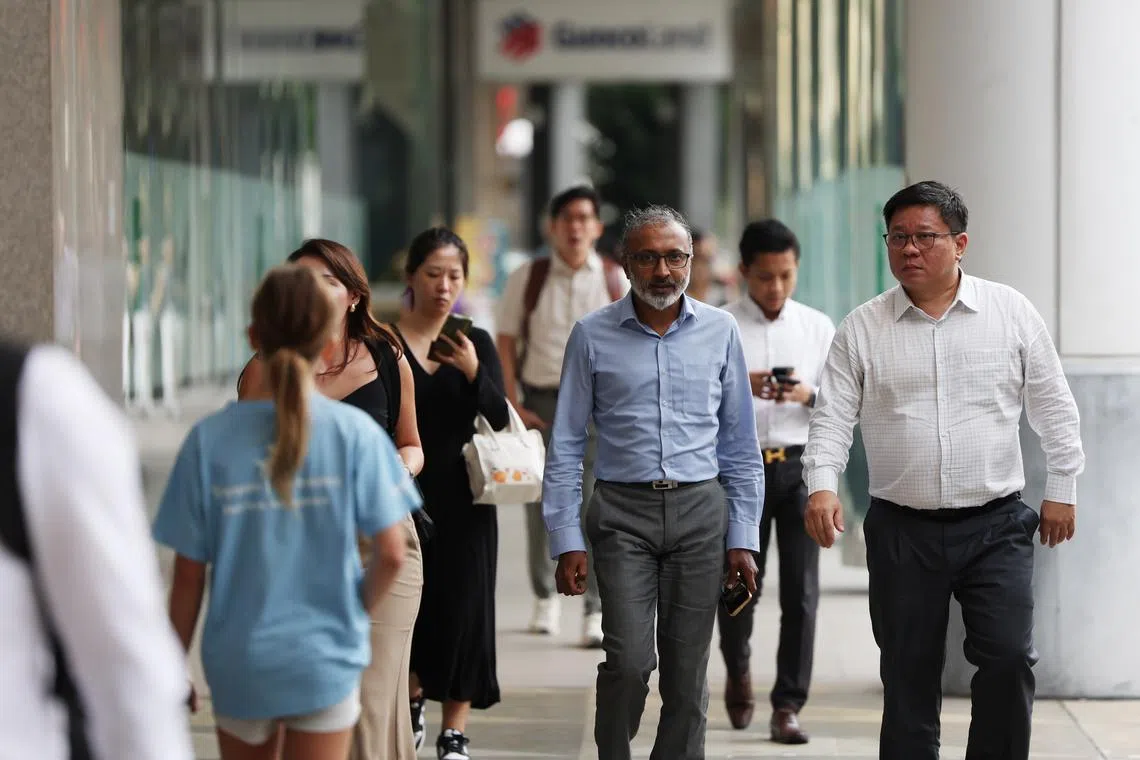Job searching, hiring in S’pore got tougher in 2024 amid rapidly changing skill needs: LinkedIn
Sign up now: Get tips on how to grow your career and money

More than 60 per cent of workers, or six in 10, found that the job search got more difficult in 2024.
ST PHOTO: BRIAN TEO
SINGAPORE – Over the last year, it has become harder for both job seekers and hirers here to find the right match, the latest reflection of how fast skill needs are changing in Singapore, according to LinkedIn.
About six in 10 workers (61 per cent) found that the job search got more difficult in 2024, according to results released on Jan 16 of a poll of more than 1,000 Singapore workers conducted over November and December 2024.
This outstrips a global average of 50 per cent in Singapore and 16 other markets.
The most commonly reported issue lay in finding a job that matches one’s personal criteria, followed by negotiating salary or benefits
Nevertheless, more than 65 per cent of respondents are undeterred from searching for jobs in 2025, with younger workers leading the charge in a bid for better salaries, work-life balance and career growth.
Conversely, half of the 500 hiring professionals LinkedIn polled separately said it has become more challenging to find qualified talent over the past year.
Only 3.4 per cent of the applications received met all the required and preferred qualifications for a given opening.
Ms Chua Pei Ying, LinkedIn’s Asia-Pacific chief economist, told The Straits Times that these figures show how fast the labour market is changing.
She said that even if one remains in the same job, the skill sets needed in Singapore are set to change by around 70 per cent by 2030 compared with 2016, due to technological advances and other changes.

Ms Chua Pei Ying, LinkedIn’s Asia-Pacific chief economist, told The Straits Times that these figures show how fast the labour market is changing.
ST PHOTO: MARK CHEONG
Over the same period, skill needs are estimated to change by 64 per cent in India and 66 per cent in Australia.
From 2024 to 2030, the change in required skills in Singapore is over 30 per cent.
The pace of change dovetails with an improving outlook, with three in four human resources leaders expressing plans to hire more in 2025 than in 2024.
LinkedIn’s latest edition of its annual Jobs On The Rise list, also released on Jan 16, revealed that hiring interest extends beyond the technology and finance sectors that tend to hog the headlines.
Roles in engineering, sustainability and food and beverage services that are not yet readily supplanted by artificial intelligence (AI) are also sought after in Singapore.
For this list, LinkedIn, which has over four million users here, ranked the fastest-growing jobs in the Singapore market based on both job listings and members who said they held that job from the start of 2022 to end-July 2024.
Food and beverage assistants were on top with a 92 per cent average annual growth rate over the period studied.
AI researchers were in second place with an 81 per cent growth rate, while electrical and instrumentation technicians followed closely behind at 78 per cent.
LinkedIn noted that roles on the list such as food and beverage assistant and facilities coordinator reflect post-Covid-19 recovery trends in the broader economy, including the rebound of the hospitality sector and the return of workers to offices.
Two-thirds of the jobs on the latest list are new to the list, Ms Chua said, underscoring the importance of finding ways to secure these coveted roles amid the rapidly changing jobs landscape.
To help address the mismatch between job seekers and hirers that it has observed, the platform is rolling out an AI-powered job recommendation system that not only looks at what users explicitly list as their skills, but also infers likely skills from their usage patterns.
For instance, a LinkedIn member writing an article on digital marketing best practices and posting about it on the platform can be expected to have digital marketing skills, even if not explicitly listed on the member profile, a LinkedIn spokeswoman said.
This means members could get recommended better job matches, with more nuanced matching that goes beyond just keywords. They will also be able to see how well they match with any job opening they browse.
Correction note: This story has been updated with corrected information provided by LinkedIn.



